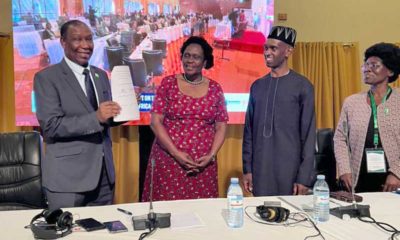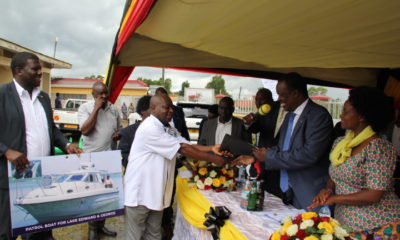News
Nile talks hit dead end, again
Nile Countries Unite Against Egypt ‘Imperialism’
chairman of Nile Council of Ministers and Uganda’s Minister of Water and EnvironmentAll nine of the ten member countries of the Nile Basin this week re-asserted their right over the use of the waters of river Nile, and rejected Egypt’s colonial era demands that it has absolute rights and hence control of the Nile waters.
Ministers and government representatives from eight member countries of the Nile Basin met in Entebbe this week to try to persuade Egypt to come back into the organisation it exited in 2000 when countries rejected its alleged rights over water.
With the exception of D.R Congo, the rest of the members of the Nile Basin Initiative including Uganda, Kenya, Tanzania, Burundi, Rwanda, South Sudan, Ethiopia, Sudan and Egypt had representatives at an extraordinary Nile Council of Ministers meeting held in Entebbe, Uganda.
Having failed to persuade all other NBI member countries to accept Egypt’s automatic control of the river, the Entebbe meeting accepted to allow Egyptian officials to go back to Cairo and make a response in one month.
The high-level meeting of the Nile Council of Ministers, which is chaired by Uganda’s minister of Water Sam Cheptoris, was characterised by a tense atmosphere and endless negotiations that stretched over 15 hours.
The talks, described as highly sensitive and akin to nuclear talks by some of the participants, came against a decision by member countries of the Nile Basin to try to persuade Egypt to return to the negotiating table, and perhaps sign the Cooperative Framework Agreement (CFA).
The CFA is supposed to provide for a mechanism of cooperation among all the ten member countries, in the management of the Nile basin water resources, as opposed to water use allocations.
The CFA is meant to replace the colonial era ‘agreements’ that gave absolute rights to all the waters of the Nile to Egypt in a 1929 agreement that was signed by the British colonialists and Egypt.
Whereas other countries in the basin have since attaining independence, rejected Egypt’s claims, many have feared facing the military might of the North African country by undertaking major water-use projects. Egypt has warned of going to war with other countries in the event other countries tampered with the Nile waters that are considered the life blood of the country.
But Minister Cheptoris noted that with the exception of Egypt, all the other nine NBI partner countries agree to work under a new Cooperative Framework Agreement.
Cheptoris says: “Egypt wants all NBI countries to accept the colonial era agreements that gives them exclusive rights over the use of the Nile waters. But other countries are saying no.”
He noted that Egypt actually uses most of the water in its expansive irrigation operations, compared to other countries which only use the waters for hydro-power generation.
Because of rising population pressure in the region, coupled with the challenges of climate change, many experts are calling on countries like Uganda to step up efforts on irrigation to supplement rain-fed agriculture.
Recently, the Ethiopian Prime Hailemariam Desalegne was in Uganda to talk to President Museveni about implementation of the CFA. Six countries have so far signed the CFA and sources at the NBI tell The Sunrise that Sudan has also expressed willingness to sign the Cooperative Framework.
Heads of State from the NBI member countries are expected to meet in June this year to finally agree on the way forward as far as implementing the CFO is concerned.
Independent observers however point out that the claim advanced by countries like Uganda for failing to use the Nile for irrigation, is simply an excuse by the countries, as evidenced by Ethiopia’s ability to build the biggest power dam in Africa, without protestations from Cairo.
One Ethiopia official, who preferred anonymity explained that Egypt cannot stop other countries from using the Nile waters. He pointed out that by the British allocating full rights to Egypt over the Nile, the had selfish concerns of helping the north African country to continue to produce cotton to feed factories in Manchester and other UK towns.
Comments



























